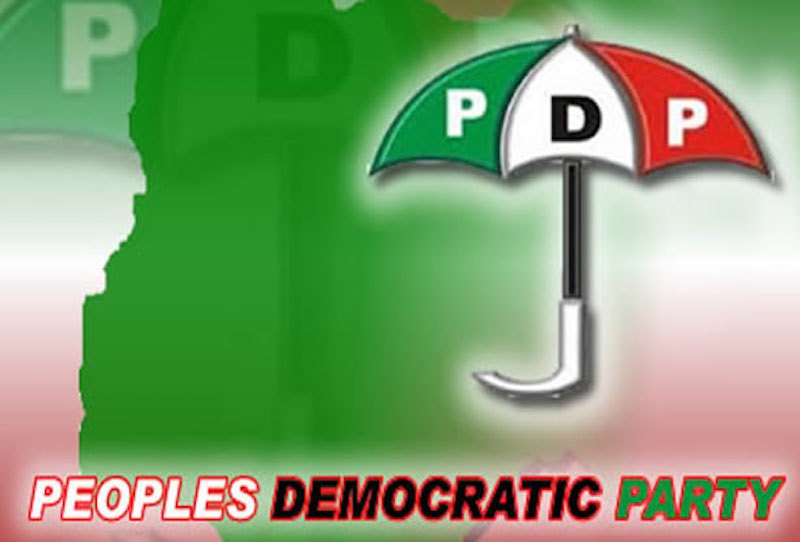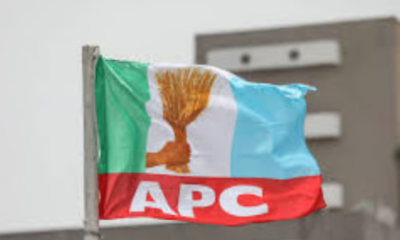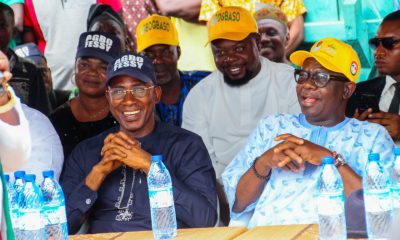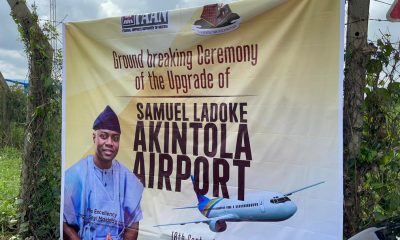By SUNDAY ODIBASHI
The Peoples Democratic Party (PDP), major Opposition Political Party in Nigeria, will have a herculean task of maintaining harmony of interests in the party after the Saturday, December 9, 2017, National Convention where members of the National Working Committee (NWC) will be elected to steer the party’s ship into the 2019 general elections.
This is not unc0onnected with the obvious disquiet and discontentment by some of the candidates contesting the national chairman of the party.
PDP leaders had in attempt to minimize or eliminate such controversies, zoned the national chairman to the South but did not extend the decision to micro zoning of a particular goe-political bloc. Thus, candidates emanated from the South West and the South-South.
Efforts to subject the zoning to the South West generated relative controversy, while attempts arrange for a consensus candidate to improve the chances of the South West also hit the rock; those eliminated from the negotiation insisted on not withdrawing from the race.
Subsequently, there were innuendoes that a certain candidate from the South-South has been favoured by some party leaders from the North for the national chairman, this also generated another level of controversy leading to the call for the resignation of Ahmed Makarfi, PDP National Caretaker Committee Chairman by some candidates from the South West.
Apparently, all the eight candidates for the national chairman, who include High Chief Raymond Dokpesi and Uche Secondus from the South-South; Chief Bode George, Jimi Agbaje, Gbenga Daniel, Tunde Adeniran, Taoheed Adedoja and Rashidi Ladoja from the South West will testing the popularity at the December 9 national convention.
The controversies trailing the build up to the convention presuppose that the PDP leaders should allow transparent polling such that the winner will emerge to the satisfaction of all stakeholders. The candidates are naturally aware that the office of the national chairman of the party is only occupies by one man and not all the candidates. The competition merely provides each candidate an opportunity to participate in the process which has high level of probability.
Spotlight on the candidates:
Bode George
Bode George is founding member of the PDP. He was PDP National Vice Chairman, South West, Deputy National Chairman, South and National Deputy Chairman.
Bode George was appointed Chairman of the Board of Nigerian Ports Authority in 1999 by President Olusegun Obasanjo. He fell into the corruption trap of the Economic and Financial Crimes Commission (EFCC) in 2008 after his tenure as NPA Chairman.
He was sentenced with five other persons to 28 years imprisonment on October 26, 2009 by a Lagos High Court for contract splitting and inflation. After serving our his jail terms, which ran concurrently and ended within short period, Bode George his imprisonment, leading t0 the Supreme Court nullifying his conviction on December 13, 2013.
In politics, Bode George has acquired experience, and has the charisma to influence decisions in the party with minimal resistance. However, he belongs to the old school, particularly, the generation of party leaders that caused deep controversies in the past.
Meanwhile, rebuilding the PDP after the protracted leadership crisis and the woes of the 2015 general elections, requires new generation leadership which may not exist in Bode George. Accordingly, Bode George’s political liability may outweigh his political asset in a PDP in search of value re-orientation and national rebirth.
Jimi Agbaje
Jimi Agbaje stamped his political authority in Lagos State during the 2015 governorship election as PDP candidate. Many believed he won the governorship election in Lagos but was rigged out after former President Goodluck Jonathan had been defeated in the presidential election.
Jimi Agbaje, a pharmacist, was the leading candidate in the earlier PDP chairmanship race before the leadership crisis in the party scuttled the process.
He has age on his side, has energy and has paraphernalia for young generation leadership in Nigeria’s developmental democracy. He is reliable and can be trusted.
However, he has minimal experience and may have difficult task in enforcing discipline in the PDP.
Gbenga Daniel
Gbenga Daniel, a former Governor of Ogun State May 29, 2003 to May 29, 2011, at time, left the PDP for Labour Party during a battle with Senator Buruji Kashamu over PDP control in Ogun State. HE rejoined the PDP in October 2014 at the persuasion of former President Jonathan.
The former governor is believed to have remarkable support from PDP stakeholders for the national chairman. His political stature in Ogun State, extending to some parts of the South West may be a sort of asset for the PDP. He was a victim of elimination from the South West consensus candidate horse trading that failed.
Tunde Adeniran
Professor Adeniran, a former Minister of Education, Nigerian Ambassador to Germany, former Chairman of the Board of Universal Basic Education Commission (UBEC) and a professor of political science, is also a founding member of the PDP.
Adeniran was chairman of the presidential inauguration committee of Olusegun Obasanjo’s in 1999. He has remained steadfast with the PDP even in times of monumental crisis, and never defected to any other political party. His loyalty to the party is unparalleled.
Adeniran is calm, calculative, intelligent and has administrative experience that can drive proactive leadership in the party.
Taoheed Adedoja
Adedoja, a former Minister of Youth and Sports, a former Commissioner for Sports and a former Provost of the College of Education (Special) Oyo State, was governorship candidate of the PDP in Oyo State in 2015.
He doesn’t seem to be a force to reckon with in the leadership of PDP, though one of those listed for consensus candidate.
Rashidi Ladoja
Ladoja, a former PDP Governor of Oyo State, May 29, 2003; was impeached in January 2006 but reinstated in December 2006.
He dumped the PDP to f0rm Accord Party in the height of his dispute with former Governor
Christopher Alao Akala. He controls a reason grassroots population of Ibadan voters. He has not acquired experience for national leadership yet.
Raymond Dokpesi
Dokpesi, candidate from the South-South, is a founding member of the PDP, launched a wide visible campaign for the PDP national chairman across the country before the leadership crisis that threw the PDP into deeper uncertainty.
Emeritus Chairman of Daar Communications Plc, owners of AIT and Raypower Radio, formed a new political party, Advance Peoples Democratic Alliance (APDA) in the storm of the leadership crisis involving Ali Modu Sheriff and Ahmed Makarfi, when there were speculations that PDP may form a new political party if the judiciary continued to recognize Sherriff as the party leader. He, however, dumped the newly registered APDA as soon as the Supreme Court recognized Makarfi as the authentic PDP leader.
Dokpesi has wide political network dep into the North where he has maternal affinity. He understands the dynamics of party politics in Nigeria, having sojourned in the National Republican Convention (NRC) in the 1990s where he lost the presidential ticket to Bashir Tofa from Kano State.
Though Dokpesi has the capacity to provide new generation leadership for the party but many fear that he may have elements of dictatorship in him.
Uche Secondus
Secondus, a former Deputy National Chairman, later, Acting National Chairman of PDP after the exit of Adamu Mua’zu, was PDP State Chairman in Rivers State. He has good experience and knowledge of the problems of the PDP and many stakeholders believe that he is a huge asset for the Party. Secondus is said to be the favoured candidate of the North that precipitated the agitations of Bode George and Adeniran, calling for the resignation of Makarfi.
All the eight candidates will know their faith on Saturday, December 9, 2017. The PDP has been cautioned to eschew from imposition of candidate, adhere strictly to transparent election to set the pace of internal democracy in the country and forestall post-convention crisis.












 Entertainment5 days ago
Entertainment5 days ago
 Health7 days ago
Health7 days ago
 Health4 days ago
Health4 days ago
 Football1 week ago
Football1 week ago
 Football1 week ago
Football1 week ago
 Crime4 days ago
Crime4 days ago
 Education6 days ago
Education6 days ago
 Crime1 week ago
Crime1 week ago
